Career Development and Professionalism in Tourism Report
VerifiedAdded on 2020/03/28
|20
|4860
|42
Report
AI Summary
This report focuses on self-reflection and professional development within the tourism and hospitality sector. It examines how self-awareness, including understanding personality traits through models like Myers-Briggs and Big Five, can enhance career prospects. The report also explores the importance of values, motivators, emotional intelligence, and leadership skills in achieving professional success. Furthermore, it delves into decision-making and problem-solving theories to provide insights into navigating the complexities of a career in tourism. The report emphasizes how these elements contribute to personal and organizational success, highlighting the significance of self-awareness, values, and effective leadership within the industry. The student leverages these insights to understand how they can advance in their career and bring positive outcomes to the organization they work for.
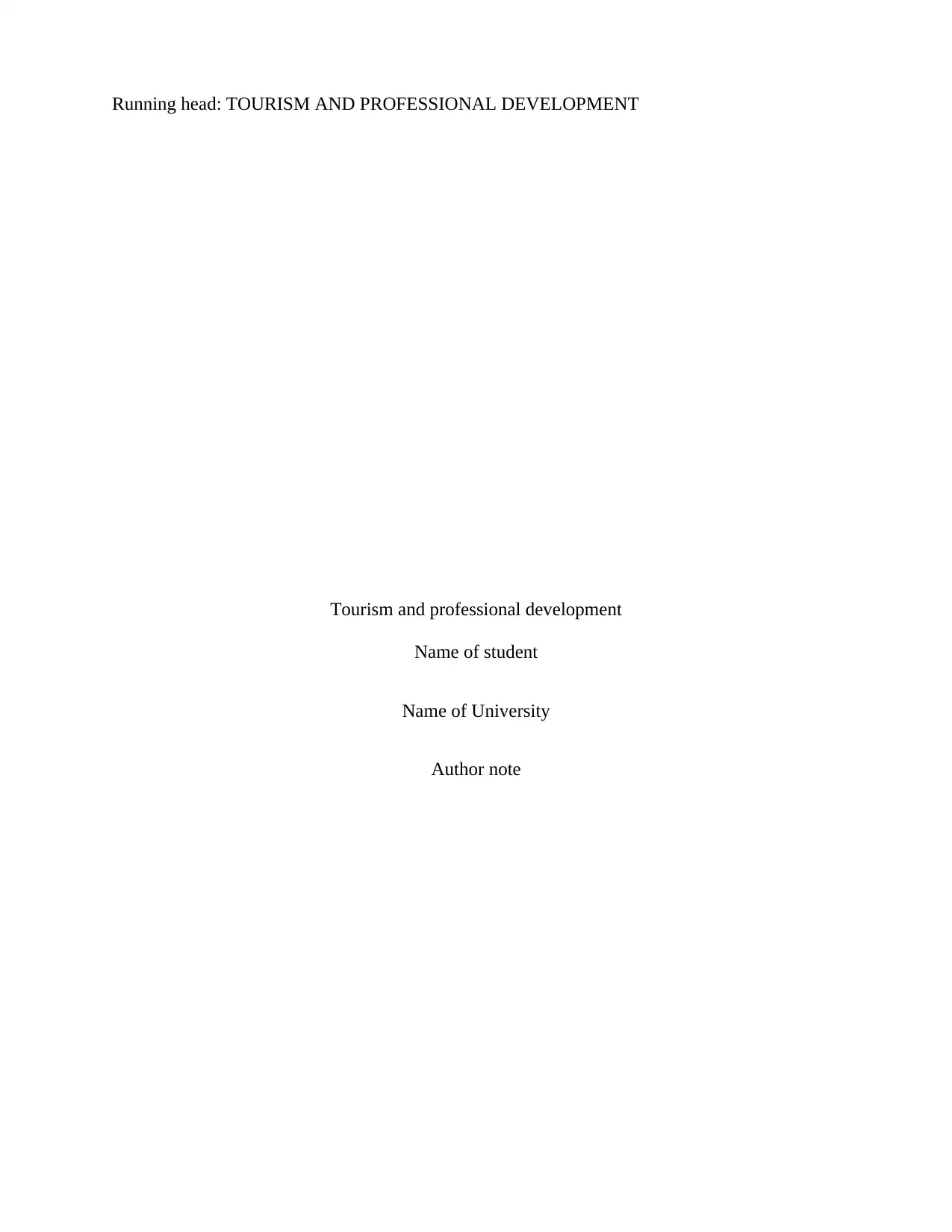
Running head: TOURISM AND PROFESSIONAL DEVELOPMENT
Tourism and professional development
Name of student
Name of University
Author note
Tourism and professional development
Name of student
Name of University
Author note
Paraphrase This Document
Need a fresh take? Get an instant paraphrase of this document with our AI Paraphraser
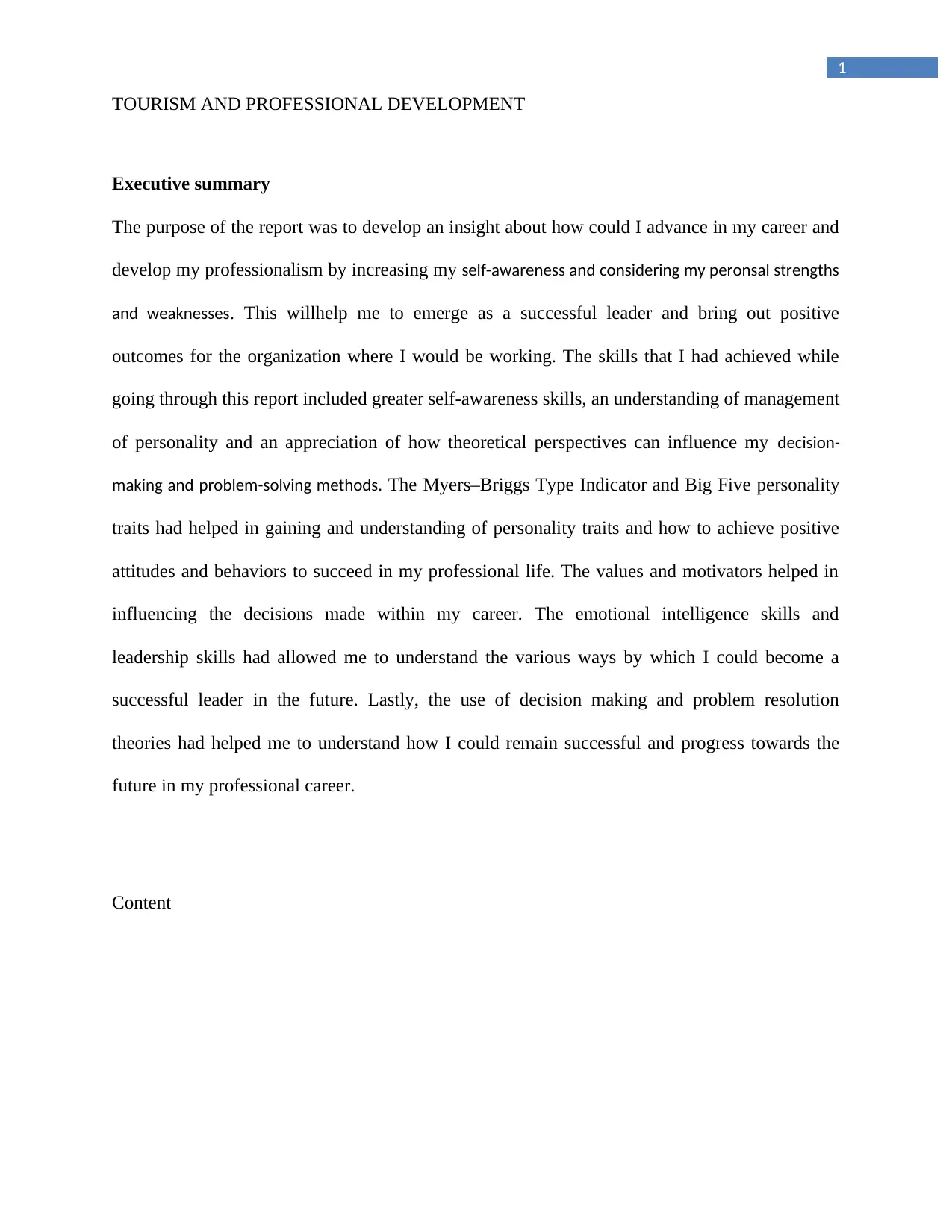
1
TOURISM AND PROFESSIONAL DEVELOPMENT
Executive summary
The purpose of the report was to develop an insight about how could I advance in my career and
develop my professionalism by increasing my self-awareness and considering my peronsal strengths
and weaknesses. This willhelp me to emerge as a successful leader and bring out positive
outcomes for the organization where I would be working. The skills that I had achieved while
going through this report included greater self-awareness skills, an understanding of management
of personality and an appreciation of how theoretical perspectives can influence my decision-
making and problem-solving methods. The Myers–Briggs Type Indicator and Big Five personality
traits had helped in gaining and understanding of personality traits and how to achieve positive
attitudes and behaviors to succeed in my professional life. The values and motivators helped in
influencing the decisions made within my career. The emotional intelligence skills and
leadership skills had allowed me to understand the various ways by which I could become a
successful leader in the future. Lastly, the use of decision making and problem resolution
theories had helped me to understand how I could remain successful and progress towards the
future in my professional career.
Content
TOURISM AND PROFESSIONAL DEVELOPMENT
Executive summary
The purpose of the report was to develop an insight about how could I advance in my career and
develop my professionalism by increasing my self-awareness and considering my peronsal strengths
and weaknesses. This willhelp me to emerge as a successful leader and bring out positive
outcomes for the organization where I would be working. The skills that I had achieved while
going through this report included greater self-awareness skills, an understanding of management
of personality and an appreciation of how theoretical perspectives can influence my decision-
making and problem-solving methods. The Myers–Briggs Type Indicator and Big Five personality
traits had helped in gaining and understanding of personality traits and how to achieve positive
attitudes and behaviors to succeed in my professional life. The values and motivators helped in
influencing the decisions made within my career. The emotional intelligence skills and
leadership skills had allowed me to understand the various ways by which I could become a
successful leader in the future. Lastly, the use of decision making and problem resolution
theories had helped me to understand how I could remain successful and progress towards the
future in my professional career.
Content
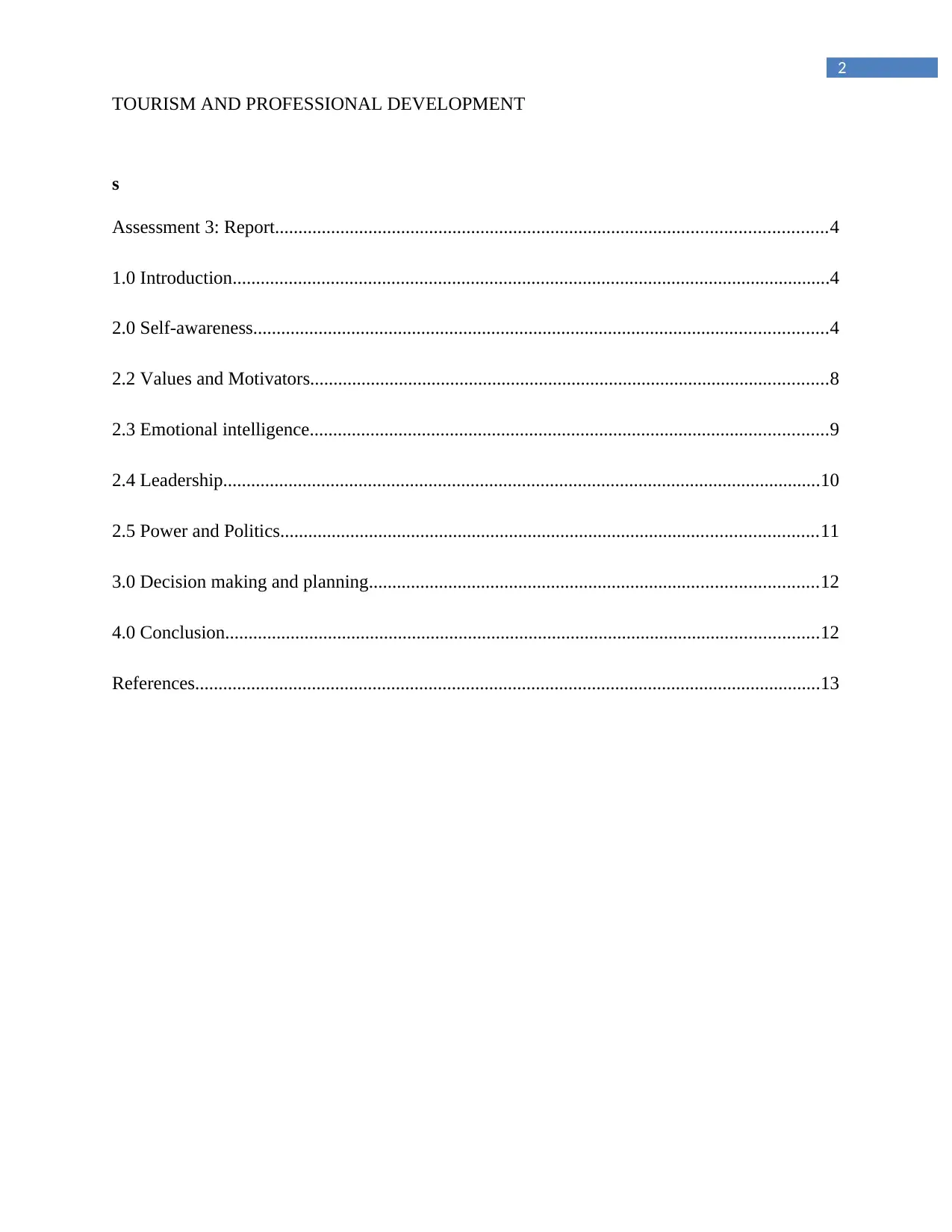
2
TOURISM AND PROFESSIONAL DEVELOPMENT
s
Assessment 3: Report......................................................................................................................4
1.0 Introduction................................................................................................................................4
2.0 Self-awareness...........................................................................................................................4
2.2 Values and Motivators...............................................................................................................8
2.3 Emotional intelligence...............................................................................................................9
2.4 Leadership................................................................................................................................10
2.5 Power and Politics...................................................................................................................11
3.0 Decision making and planning................................................................................................12
4.0 Conclusion...............................................................................................................................12
References......................................................................................................................................13
TOURISM AND PROFESSIONAL DEVELOPMENT
s
Assessment 3: Report......................................................................................................................4
1.0 Introduction................................................................................................................................4
2.0 Self-awareness...........................................................................................................................4
2.2 Values and Motivators...............................................................................................................8
2.3 Emotional intelligence...............................................................................................................9
2.4 Leadership................................................................................................................................10
2.5 Power and Politics...................................................................................................................11
3.0 Decision making and planning................................................................................................12
4.0 Conclusion...............................................................................................................................12
References......................................................................................................................................13
⊘ This is a preview!⊘
Do you want full access?
Subscribe today to unlock all pages.

Trusted by 1+ million students worldwide
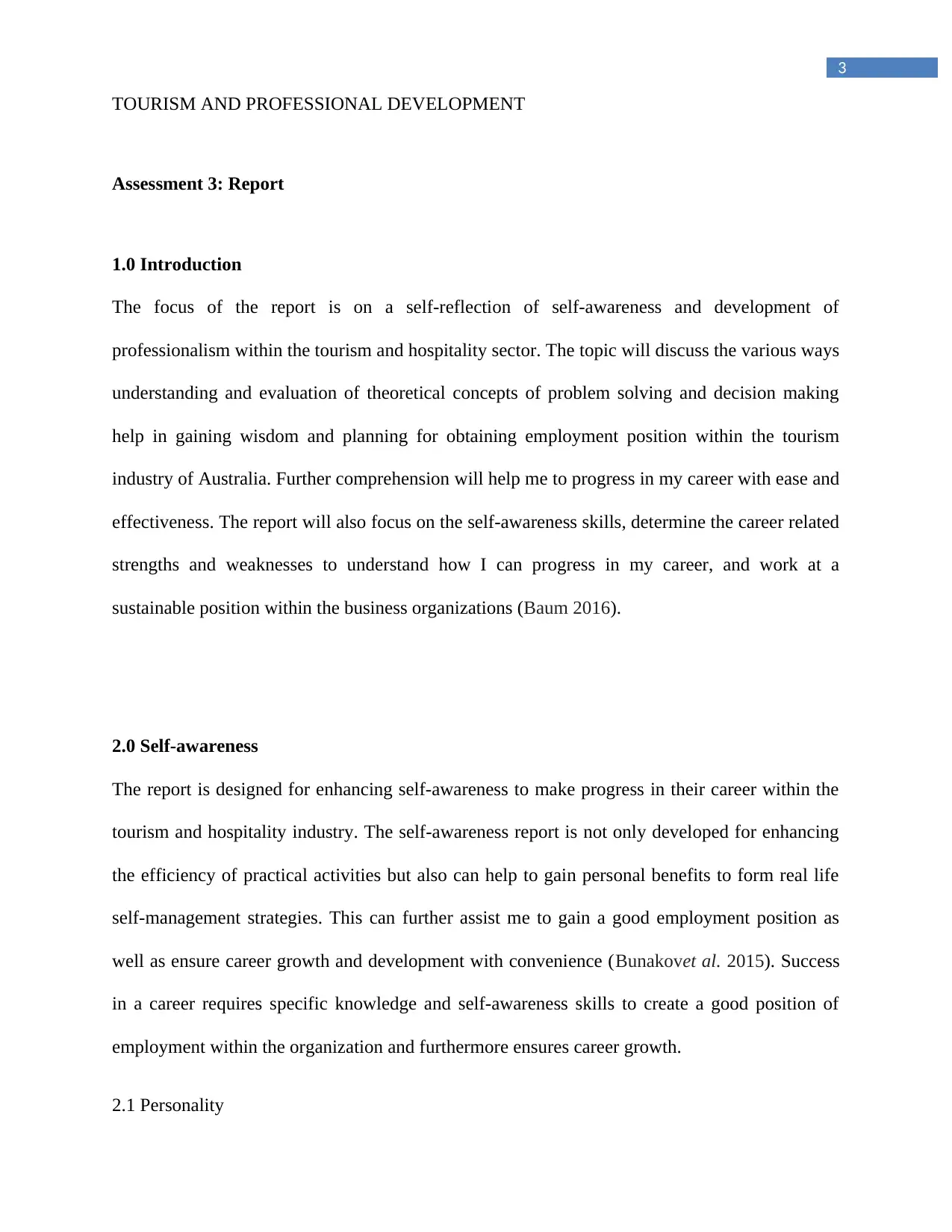
3
TOURISM AND PROFESSIONAL DEVELOPMENT
Assessment 3: Report
1.0 Introduction
The focus of the report is on a self-reflection of self-awareness and development of
professionalism within the tourism and hospitality sector. The topic will discuss the various ways
understanding and evaluation of theoretical concepts of problem solving and decision making
help in gaining wisdom and planning for obtaining employment position within the tourism
industry of Australia. Further comprehension will help me to progress in my career with ease and
effectiveness. The report will also focus on the self-awareness skills, determine the career related
strengths and weaknesses to understand how I can progress in my career, and work at a
sustainable position within the business organizations (Baum 2016).
2.0 Self-awareness
The report is designed for enhancing self-awareness to make progress in their career within the
tourism and hospitality industry. The self-awareness report is not only developed for enhancing
the efficiency of practical activities but also can help to gain personal benefits to form real life
self-management strategies. This can further assist me to gain a good employment position as
well as ensure career growth and development with convenience (Bunakovet al. 2015). Success
in a career requires specific knowledge and self-awareness skills to create a good position of
employment within the organization and furthermore ensures career growth.
2.1 Personality
TOURISM AND PROFESSIONAL DEVELOPMENT
Assessment 3: Report
1.0 Introduction
The focus of the report is on a self-reflection of self-awareness and development of
professionalism within the tourism and hospitality sector. The topic will discuss the various ways
understanding and evaluation of theoretical concepts of problem solving and decision making
help in gaining wisdom and planning for obtaining employment position within the tourism
industry of Australia. Further comprehension will help me to progress in my career with ease and
effectiveness. The report will also focus on the self-awareness skills, determine the career related
strengths and weaknesses to understand how I can progress in my career, and work at a
sustainable position within the business organizations (Baum 2016).
2.0 Self-awareness
The report is designed for enhancing self-awareness to make progress in their career within the
tourism and hospitality industry. The self-awareness report is not only developed for enhancing
the efficiency of practical activities but also can help to gain personal benefits to form real life
self-management strategies. This can further assist me to gain a good employment position as
well as ensure career growth and development with convenience (Bunakovet al. 2015). Success
in a career requires specific knowledge and self-awareness skills to create a good position of
employment within the organization and furthermore ensures career growth.
2.1 Personality
Paraphrase This Document
Need a fresh take? Get an instant paraphrase of this document with our AI Paraphraser
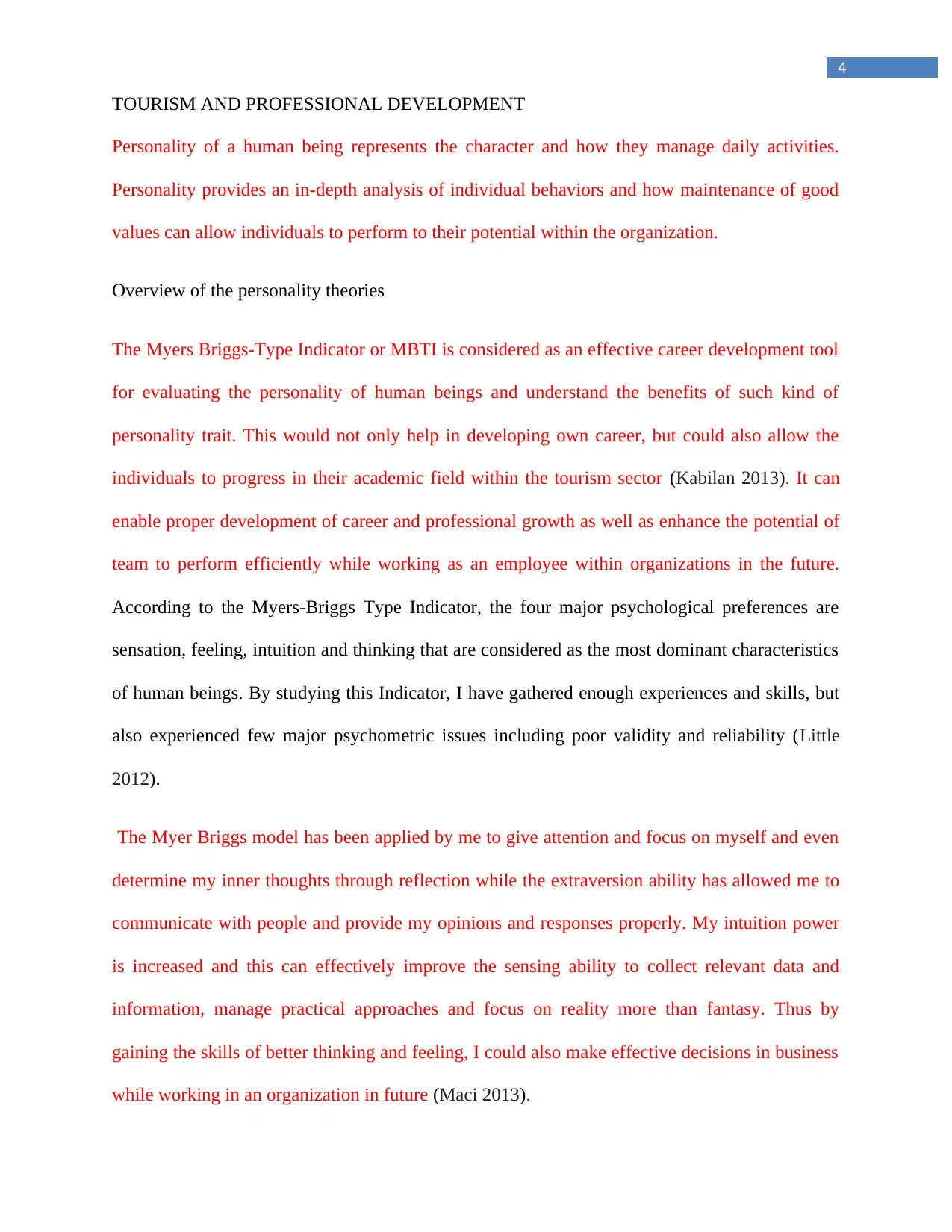
4
TOURISM AND PROFESSIONAL DEVELOPMENT
Personality of a human being represents the character and how they manage daily activities.
Personality provides an in-depth analysis of individual behaviors and how maintenance of good
values can allow individuals to perform to their potential within the organization.
Overview of the personality theories
The Myers Briggs-Type Indicator or MBTI is considered as an effective career development tool
for evaluating the personality of human beings and understand the benefits of such kind of
personality trait. This would not only help in developing own career, but could also allow the
individuals to progress in their academic field within the tourism sector (Kabilan 2013). It can
enable proper development of career and professional growth as well as enhance the potential of
team to perform efficiently while working as an employee within organizations in the future.
According to the Myers-Briggs Type Indicator, the four major psychological preferences are
sensation, feeling, intuition and thinking that are considered as the most dominant characteristics
of human beings. By studying this Indicator, I have gathered enough experiences and skills, but
also experienced few major psychometric issues including poor validity and reliability (Little
2012).
The Myer Briggs model has been applied by me to give attention and focus on myself and even
determine my inner thoughts through reflection while the extraversion ability has allowed me to
communicate with people and provide my opinions and responses properly. My intuition power
is increased and this can effectively improve the sensing ability to collect relevant data and
information, manage practical approaches and focus on reality more than fantasy. Thus by
gaining the skills of better thinking and feeling, I could also make effective decisions in business
while working in an organization in future (Maci 2013).
TOURISM AND PROFESSIONAL DEVELOPMENT
Personality of a human being represents the character and how they manage daily activities.
Personality provides an in-depth analysis of individual behaviors and how maintenance of good
values can allow individuals to perform to their potential within the organization.
Overview of the personality theories
The Myers Briggs-Type Indicator or MBTI is considered as an effective career development tool
for evaluating the personality of human beings and understand the benefits of such kind of
personality trait. This would not only help in developing own career, but could also allow the
individuals to progress in their academic field within the tourism sector (Kabilan 2013). It can
enable proper development of career and professional growth as well as enhance the potential of
team to perform efficiently while working as an employee within organizations in the future.
According to the Myers-Briggs Type Indicator, the four major psychological preferences are
sensation, feeling, intuition and thinking that are considered as the most dominant characteristics
of human beings. By studying this Indicator, I have gathered enough experiences and skills, but
also experienced few major psychometric issues including poor validity and reliability (Little
2012).
The Myer Briggs model has been applied by me to give attention and focus on myself and even
determine my inner thoughts through reflection while the extraversion ability has allowed me to
communicate with people and provide my opinions and responses properly. My intuition power
is increased and this can effectively improve the sensing ability to collect relevant data and
information, manage practical approaches and focus on reality more than fantasy. Thus by
gaining the skills of better thinking and feeling, I could also make effective decisions in business
while working in an organization in future (Maci 2013).
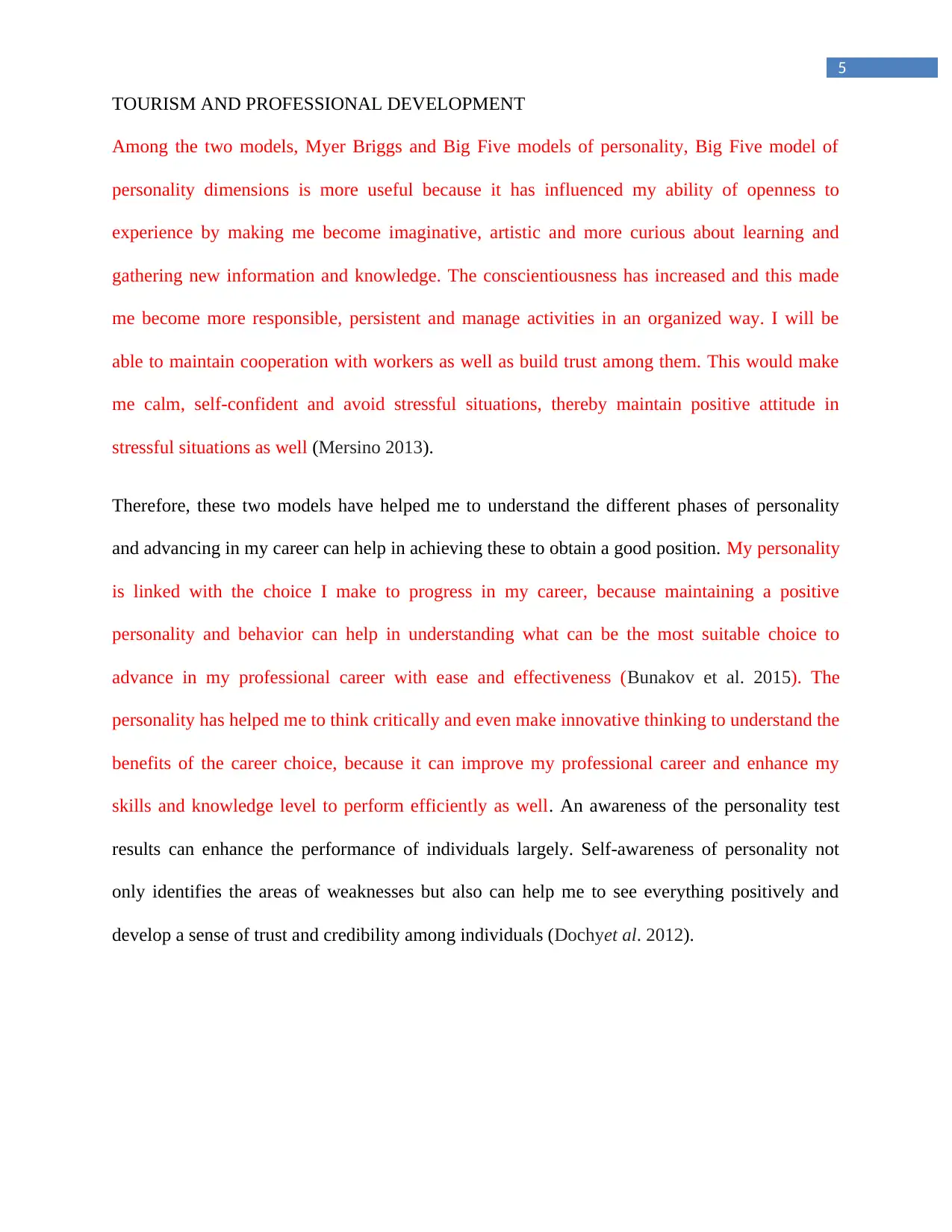
5
TOURISM AND PROFESSIONAL DEVELOPMENT
Among the two models, Myer Briggs and Big Five models of personality, Big Five model of
personality dimensions is more useful because it has influenced my ability of openness to
experience by making me become imaginative, artistic and more curious about learning and
gathering new information and knowledge. The conscientiousness has increased and this made
me become more responsible, persistent and manage activities in an organized way. I will be
able to maintain cooperation with workers as well as build trust among them. This would make
me calm, self-confident and avoid stressful situations, thereby maintain positive attitude in
stressful situations as well (Mersino 2013).
Therefore, these two models have helped me to understand the different phases of personality
and advancing in my career can help in achieving these to obtain a good position. My personality
is linked with the choice I make to progress in my career, because maintaining a positive
personality and behavior can help in understanding what can be the most suitable choice to
advance in my professional career with ease and effectiveness (Bunakov et al. 2015). The
personality has helped me to think critically and even make innovative thinking to understand the
benefits of the career choice, because it can improve my professional career and enhance my
skills and knowledge level to perform efficiently as well. An awareness of the personality test
results can enhance the performance of individuals largely. Self-awareness of personality not
only identifies the areas of weaknesses but also can help me to see everything positively and
develop a sense of trust and credibility among individuals (Dochyet al. 2012).
TOURISM AND PROFESSIONAL DEVELOPMENT
Among the two models, Myer Briggs and Big Five models of personality, Big Five model of
personality dimensions is more useful because it has influenced my ability of openness to
experience by making me become imaginative, artistic and more curious about learning and
gathering new information and knowledge. The conscientiousness has increased and this made
me become more responsible, persistent and manage activities in an organized way. I will be
able to maintain cooperation with workers as well as build trust among them. This would make
me calm, self-confident and avoid stressful situations, thereby maintain positive attitude in
stressful situations as well (Mersino 2013).
Therefore, these two models have helped me to understand the different phases of personality
and advancing in my career can help in achieving these to obtain a good position. My personality
is linked with the choice I make to progress in my career, because maintaining a positive
personality and behavior can help in understanding what can be the most suitable choice to
advance in my professional career with ease and effectiveness (Bunakov et al. 2015). The
personality has helped me to think critically and even make innovative thinking to understand the
benefits of the career choice, because it can improve my professional career and enhance my
skills and knowledge level to perform efficiently as well. An awareness of the personality test
results can enhance the performance of individuals largely. Self-awareness of personality not
only identifies the areas of weaknesses but also can help me to see everything positively and
develop a sense of trust and credibility among individuals (Dochyet al. 2012).
⊘ This is a preview!⊘
Do you want full access?
Subscribe today to unlock all pages.

Trusted by 1+ million students worldwide
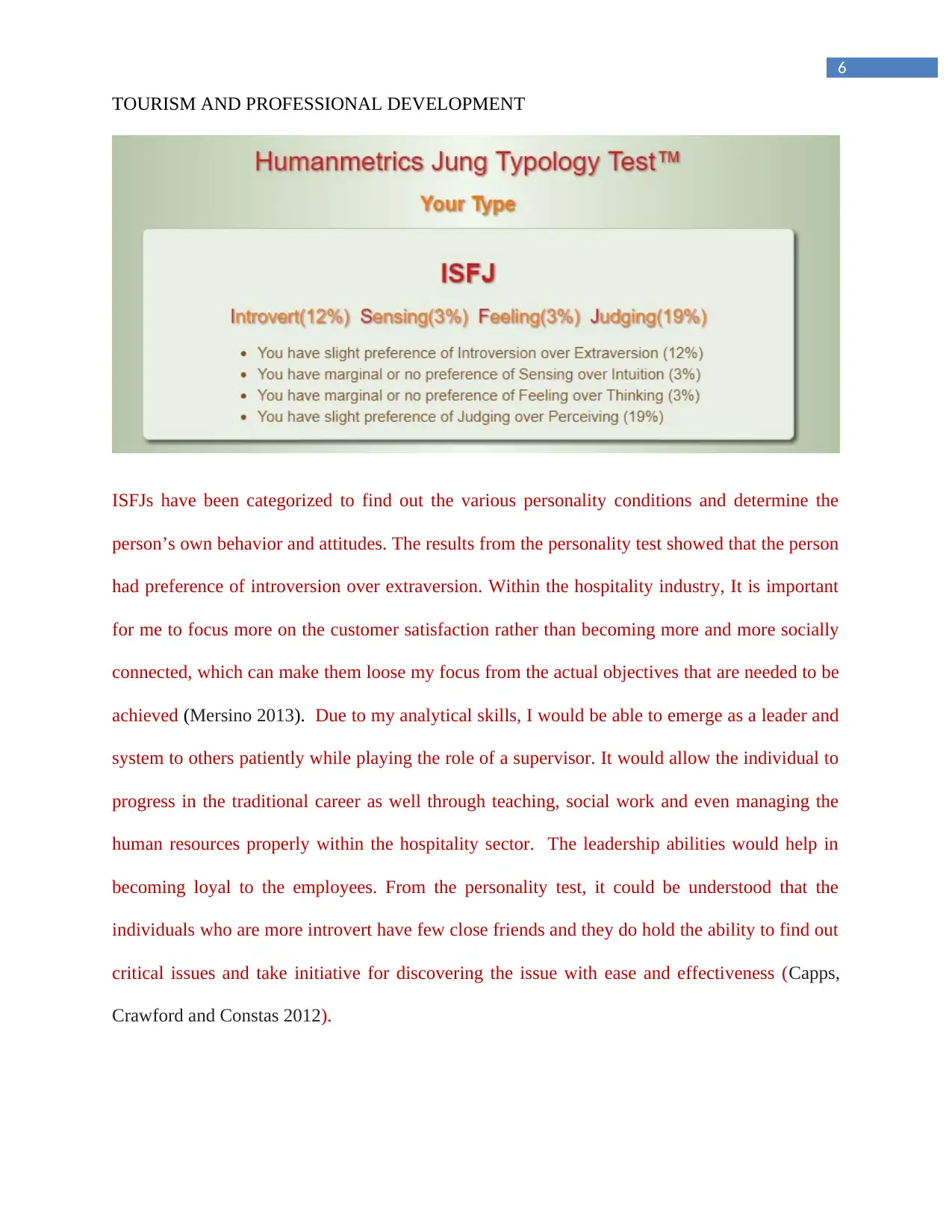
6
TOURISM AND PROFESSIONAL DEVELOPMENT
ISFJs have been categorized to find out the various personality conditions and determine the
person’s own behavior and attitudes. The results from the personality test showed that the person
had preference of introversion over extraversion. Within the hospitality industry, It is important
for me to focus more on the customer satisfaction rather than becoming more and more socially
connected, which can make them loose my focus from the actual objectives that are needed to be
achieved (Mersino 2013). Due to my analytical skills, I would be able to emerge as a leader and
system to others patiently while playing the role of a supervisor. It would allow the individual to
progress in the traditional career as well through teaching, social work and even managing the
human resources properly within the hospitality sector. The leadership abilities would help in
becoming loyal to the employees. From the personality test, it could be understood that the
individuals who are more introvert have few close friends and they do hold the ability to find out
critical issues and take initiative for discovering the issue with ease and effectiveness (Capps,
Crawford and Constas 2012).
TOURISM AND PROFESSIONAL DEVELOPMENT
ISFJs have been categorized to find out the various personality conditions and determine the
person’s own behavior and attitudes. The results from the personality test showed that the person
had preference of introversion over extraversion. Within the hospitality industry, It is important
for me to focus more on the customer satisfaction rather than becoming more and more socially
connected, which can make them loose my focus from the actual objectives that are needed to be
achieved (Mersino 2013). Due to my analytical skills, I would be able to emerge as a leader and
system to others patiently while playing the role of a supervisor. It would allow the individual to
progress in the traditional career as well through teaching, social work and even managing the
human resources properly within the hospitality sector. The leadership abilities would help in
becoming loyal to the employees. From the personality test, it could be understood that the
individuals who are more introvert have few close friends and they do hold the ability to find out
critical issues and take initiative for discovering the issue with ease and effectiveness (Capps,
Crawford and Constas 2012).
Paraphrase This Document
Need a fresh take? Get an instant paraphrase of this document with our AI Paraphraser
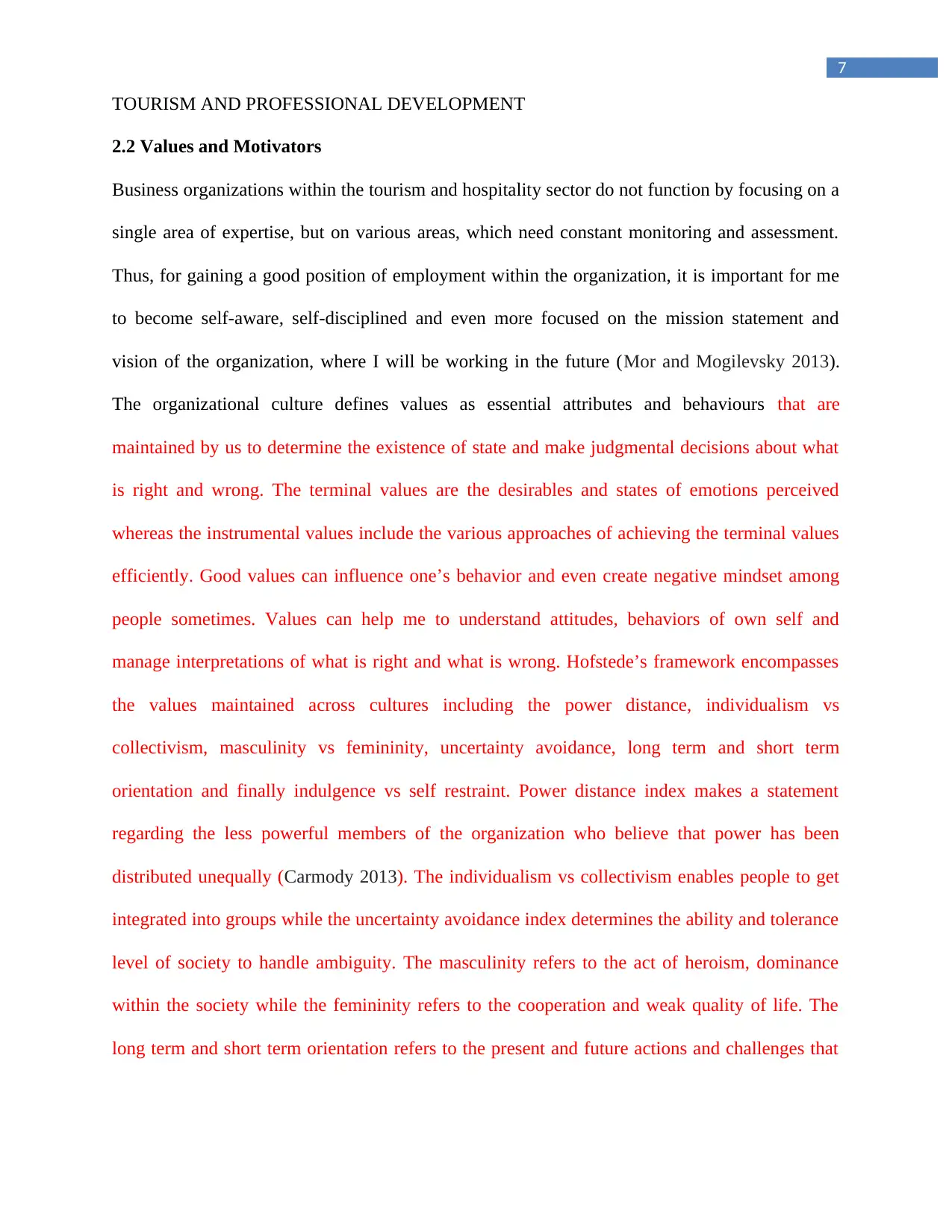
7
TOURISM AND PROFESSIONAL DEVELOPMENT
2.2 Values and Motivators
Business organizations within the tourism and hospitality sector do not function by focusing on a
single area of expertise, but on various areas, which need constant monitoring and assessment.
Thus, for gaining a good position of employment within the organization, it is important for me
to become self-aware, self-disciplined and even more focused on the mission statement and
vision of the organization, where I will be working in the future (Mor and Mogilevsky 2013).
The organizational culture defines values as essential attributes and behaviours that are
maintained by us to determine the existence of state and make judgmental decisions about what
is right and wrong. The terminal values are the desirables and states of emotions perceived
whereas the instrumental values include the various approaches of achieving the terminal values
efficiently. Good values can influence one’s behavior and even create negative mindset among
people sometimes. Values can help me to understand attitudes, behaviors of own self and
manage interpretations of what is right and what is wrong. Hofstede’s framework encompasses
the values maintained across cultures including the power distance, individualism vs
collectivism, masculinity vs femininity, uncertainty avoidance, long term and short term
orientation and finally indulgence vs self restraint. Power distance index makes a statement
regarding the less powerful members of the organization who believe that power has been
distributed unequally (Carmody 2013). The individualism vs collectivism enables people to get
integrated into groups while the uncertainty avoidance index determines the ability and tolerance
level of society to handle ambiguity. The masculinity refers to the act of heroism, dominance
within the society while the femininity refers to the cooperation and weak quality of life. The
long term and short term orientation refers to the present and future actions and challenges that
TOURISM AND PROFESSIONAL DEVELOPMENT
2.2 Values and Motivators
Business organizations within the tourism and hospitality sector do not function by focusing on a
single area of expertise, but on various areas, which need constant monitoring and assessment.
Thus, for gaining a good position of employment within the organization, it is important for me
to become self-aware, self-disciplined and even more focused on the mission statement and
vision of the organization, where I will be working in the future (Mor and Mogilevsky 2013).
The organizational culture defines values as essential attributes and behaviours that are
maintained by us to determine the existence of state and make judgmental decisions about what
is right and wrong. The terminal values are the desirables and states of emotions perceived
whereas the instrumental values include the various approaches of achieving the terminal values
efficiently. Good values can influence one’s behavior and even create negative mindset among
people sometimes. Values can help me to understand attitudes, behaviors of own self and
manage interpretations of what is right and what is wrong. Hofstede’s framework encompasses
the values maintained across cultures including the power distance, individualism vs
collectivism, masculinity vs femininity, uncertainty avoidance, long term and short term
orientation and finally indulgence vs self restraint. Power distance index makes a statement
regarding the less powerful members of the organization who believe that power has been
distributed unequally (Carmody 2013). The individualism vs collectivism enables people to get
integrated into groups while the uncertainty avoidance index determines the ability and tolerance
level of society to handle ambiguity. The masculinity refers to the act of heroism, dominance
within the society while the femininity refers to the cooperation and weak quality of life. The
long term and short term orientation refers to the present and future actions and challenges that
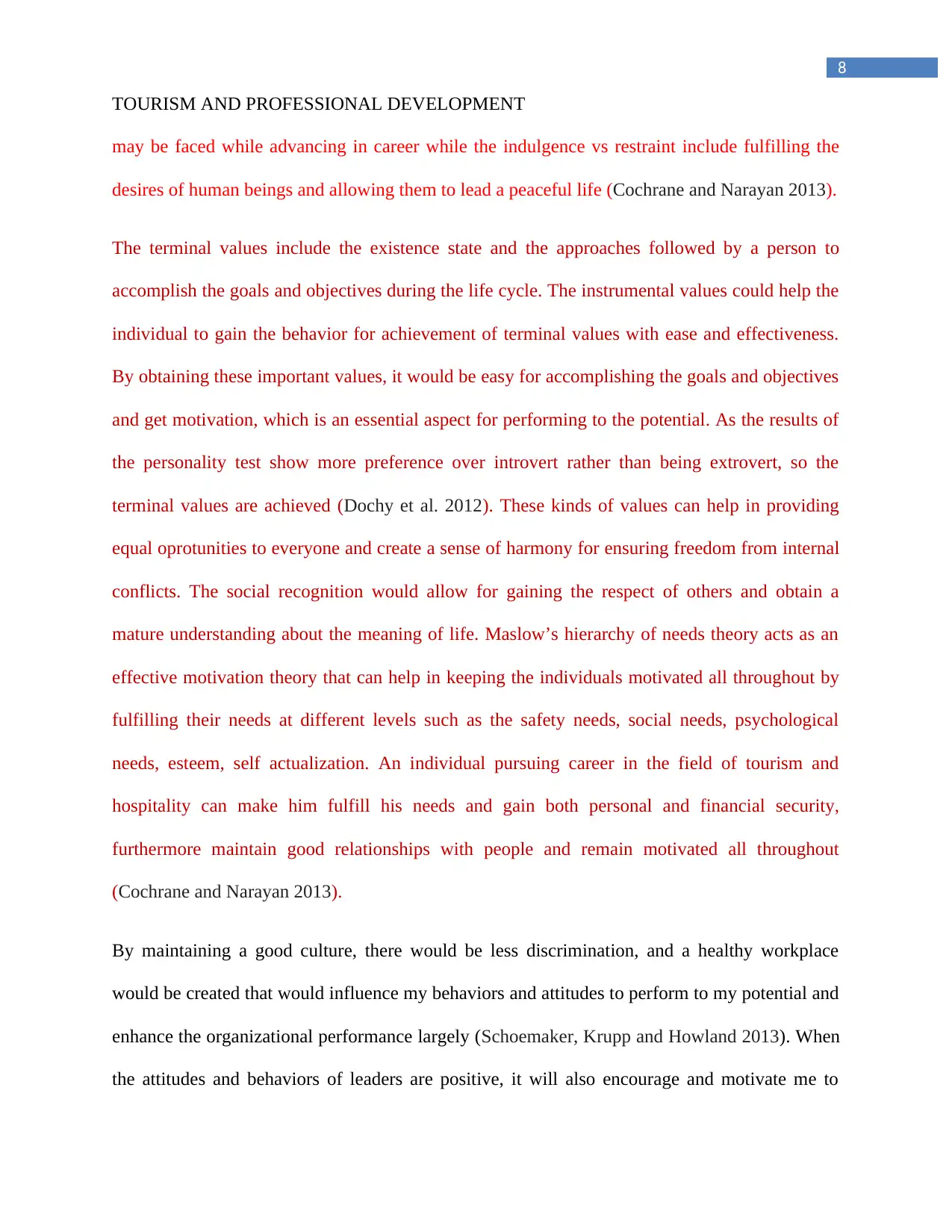
8
TOURISM AND PROFESSIONAL DEVELOPMENT
may be faced while advancing in career while the indulgence vs restraint include fulfilling the
desires of human beings and allowing them to lead a peaceful life (Cochrane and Narayan 2013).
The terminal values include the existence state and the approaches followed by a person to
accomplish the goals and objectives during the life cycle. The instrumental values could help the
individual to gain the behavior for achievement of terminal values with ease and effectiveness.
By obtaining these important values, it would be easy for accomplishing the goals and objectives
and get motivation, which is an essential aspect for performing to the potential. As the results of
the personality test show more preference over introvert rather than being extrovert, so the
terminal values are achieved (Dochy et al. 2012). These kinds of values can help in providing
equal oprotunities to everyone and create a sense of harmony for ensuring freedom from internal
conflicts. The social recognition would allow for gaining the respect of others and obtain a
mature understanding about the meaning of life. Maslow’s hierarchy of needs theory acts as an
effective motivation theory that can help in keeping the individuals motivated all throughout by
fulfilling their needs at different levels such as the safety needs, social needs, psychological
needs, esteem, self actualization. An individual pursuing career in the field of tourism and
hospitality can make him fulfill his needs and gain both personal and financial security,
furthermore maintain good relationships with people and remain motivated all throughout
(Cochrane and Narayan 2013).
By maintaining a good culture, there would be less discrimination, and a healthy workplace
would be created that would influence my behaviors and attitudes to perform to my potential and
enhance the organizational performance largely (Schoemaker, Krupp and Howland 2013). When
the attitudes and behaviors of leaders are positive, it will also encourage and motivate me to
TOURISM AND PROFESSIONAL DEVELOPMENT
may be faced while advancing in career while the indulgence vs restraint include fulfilling the
desires of human beings and allowing them to lead a peaceful life (Cochrane and Narayan 2013).
The terminal values include the existence state and the approaches followed by a person to
accomplish the goals and objectives during the life cycle. The instrumental values could help the
individual to gain the behavior for achievement of terminal values with ease and effectiveness.
By obtaining these important values, it would be easy for accomplishing the goals and objectives
and get motivation, which is an essential aspect for performing to the potential. As the results of
the personality test show more preference over introvert rather than being extrovert, so the
terminal values are achieved (Dochy et al. 2012). These kinds of values can help in providing
equal oprotunities to everyone and create a sense of harmony for ensuring freedom from internal
conflicts. The social recognition would allow for gaining the respect of others and obtain a
mature understanding about the meaning of life. Maslow’s hierarchy of needs theory acts as an
effective motivation theory that can help in keeping the individuals motivated all throughout by
fulfilling their needs at different levels such as the safety needs, social needs, psychological
needs, esteem, self actualization. An individual pursuing career in the field of tourism and
hospitality can make him fulfill his needs and gain both personal and financial security,
furthermore maintain good relationships with people and remain motivated all throughout
(Cochrane and Narayan 2013).
By maintaining a good culture, there would be less discrimination, and a healthy workplace
would be created that would influence my behaviors and attitudes to perform to my potential and
enhance the organizational performance largely (Schoemaker, Krupp and Howland 2013). When
the attitudes and behaviors of leaders are positive, it will also encourage and motivate me to
⊘ This is a preview!⊘
Do you want full access?
Subscribe today to unlock all pages.

Trusted by 1+ million students worldwide
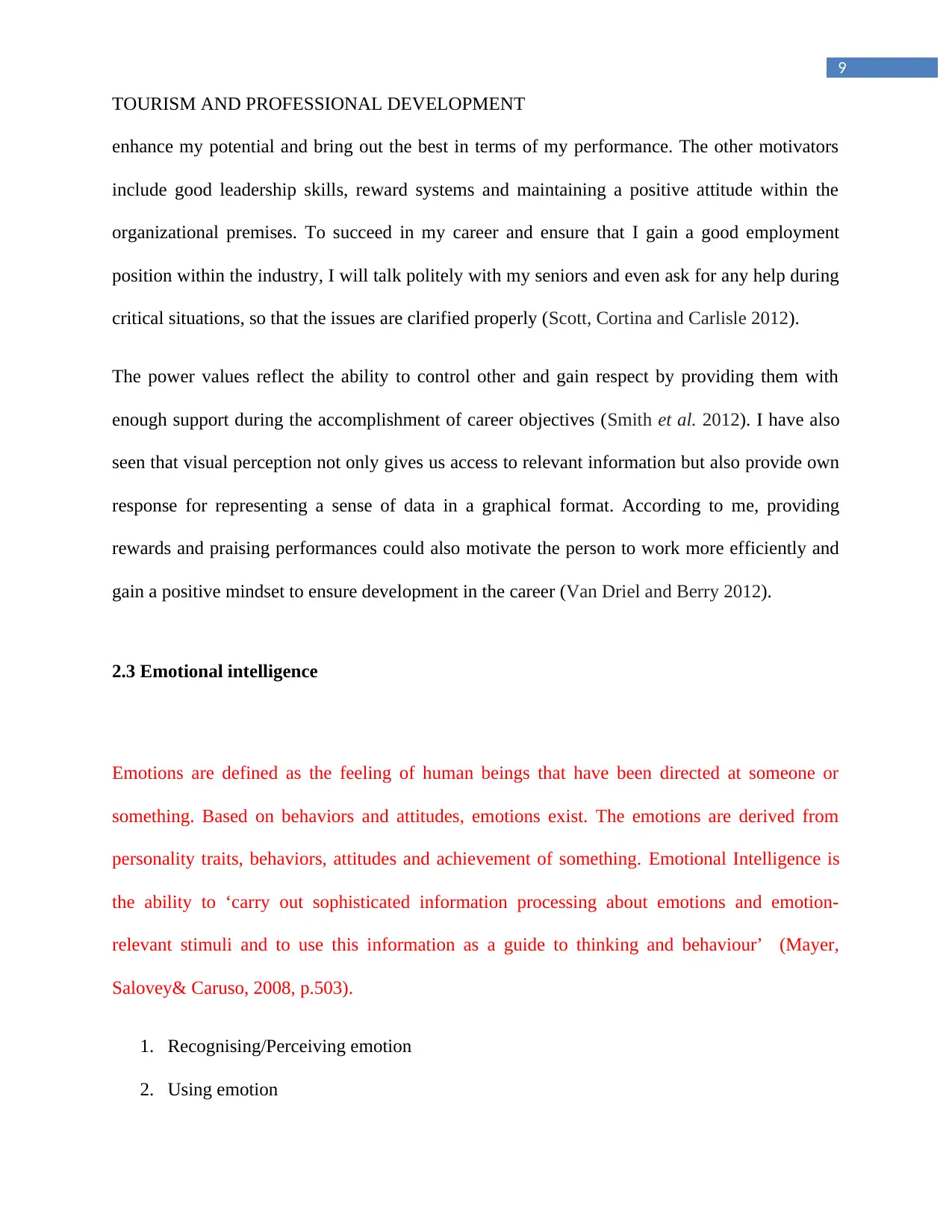
9
TOURISM AND PROFESSIONAL DEVELOPMENT
enhance my potential and bring out the best in terms of my performance. The other motivators
include good leadership skills, reward systems and maintaining a positive attitude within the
organizational premises. To succeed in my career and ensure that I gain a good employment
position within the industry, I will talk politely with my seniors and even ask for any help during
critical situations, so that the issues are clarified properly (Scott, Cortina and Carlisle 2012).
The power values reflect the ability to control other and gain respect by providing them with
enough support during the accomplishment of career objectives (Smith et al. 2012). I have also
seen that visual perception not only gives us access to relevant information but also provide own
response for representing a sense of data in a graphical format. According to me, providing
rewards and praising performances could also motivate the person to work more efficiently and
gain a positive mindset to ensure development in the career (Van Driel and Berry 2012).
2.3 Emotional intelligence
Emotions are defined as the feeling of human beings that have been directed at someone or
something. Based on behaviors and attitudes, emotions exist. The emotions are derived from
personality traits, behaviors, attitudes and achievement of something. Emotional Intelligence is
the ability to ‘carry out sophisticated information processing about emotions and emotion-
relevant stimuli and to use this information as a guide to thinking and behaviour’ (Mayer,
Salovey& Caruso, 2008, p.503).
1. Recognising/Perceiving emotion
2. Using emotion
TOURISM AND PROFESSIONAL DEVELOPMENT
enhance my potential and bring out the best in terms of my performance. The other motivators
include good leadership skills, reward systems and maintaining a positive attitude within the
organizational premises. To succeed in my career and ensure that I gain a good employment
position within the industry, I will talk politely with my seniors and even ask for any help during
critical situations, so that the issues are clarified properly (Scott, Cortina and Carlisle 2012).
The power values reflect the ability to control other and gain respect by providing them with
enough support during the accomplishment of career objectives (Smith et al. 2012). I have also
seen that visual perception not only gives us access to relevant information but also provide own
response for representing a sense of data in a graphical format. According to me, providing
rewards and praising performances could also motivate the person to work more efficiently and
gain a positive mindset to ensure development in the career (Van Driel and Berry 2012).
2.3 Emotional intelligence
Emotions are defined as the feeling of human beings that have been directed at someone or
something. Based on behaviors and attitudes, emotions exist. The emotions are derived from
personality traits, behaviors, attitudes and achievement of something. Emotional Intelligence is
the ability to ‘carry out sophisticated information processing about emotions and emotion-
relevant stimuli and to use this information as a guide to thinking and behaviour’ (Mayer,
Salovey& Caruso, 2008, p.503).
1. Recognising/Perceiving emotion
2. Using emotion
Paraphrase This Document
Need a fresh take? Get an instant paraphrase of this document with our AI Paraphraser
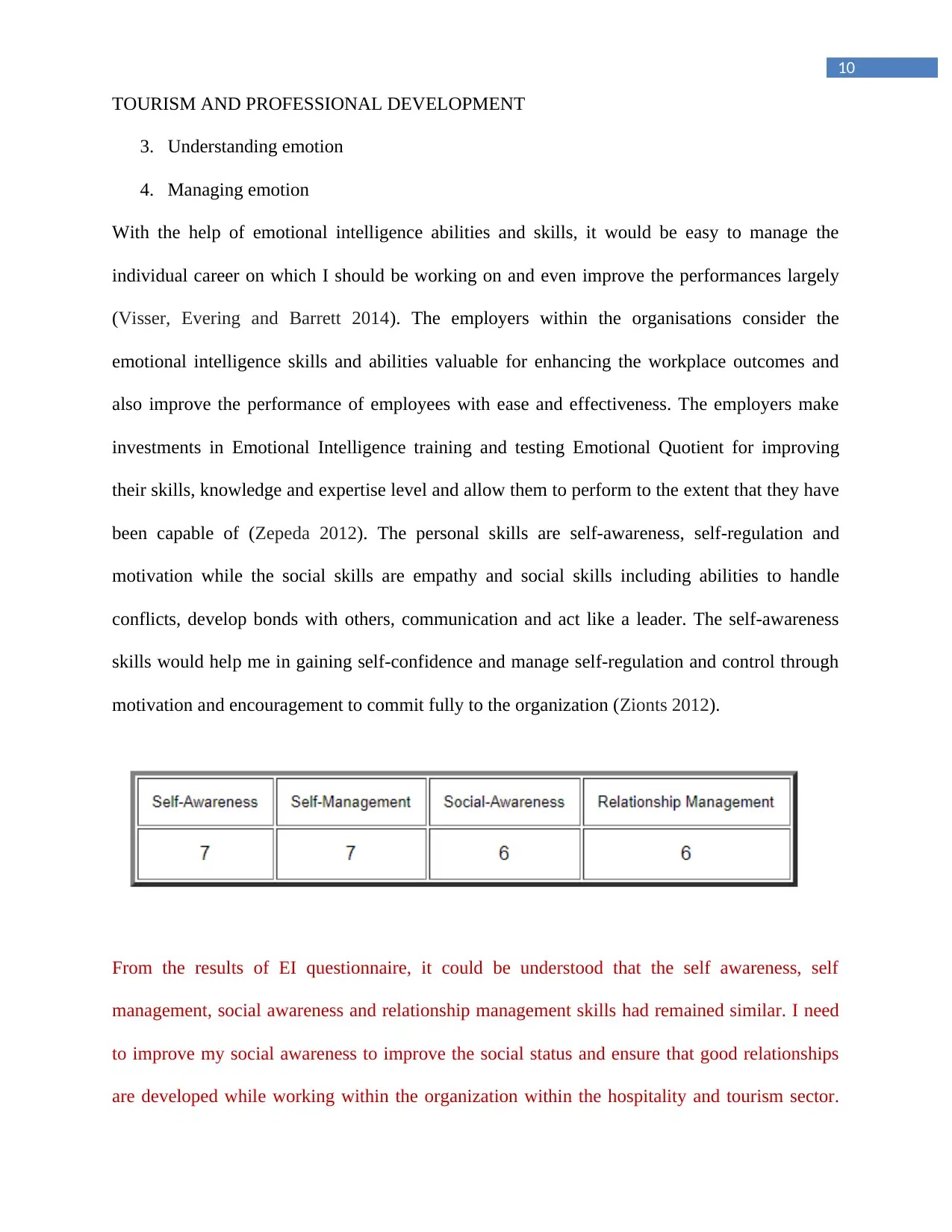
10
TOURISM AND PROFESSIONAL DEVELOPMENT
3. Understanding emotion
4. Managing emotion
With the help of emotional intelligence abilities and skills, it would be easy to manage the
individual career on which I should be working on and even improve the performances largely
(Visser, Evering and Barrett 2014). The employers within the organisations consider the
emotional intelligence skills and abilities valuable for enhancing the workplace outcomes and
also improve the performance of employees with ease and effectiveness. The employers make
investments in Emotional Intelligence training and testing Emotional Quotient for improving
their skills, knowledge and expertise level and allow them to perform to the extent that they have
been capable of (Zepeda 2012). The personal skills are self-awareness, self-regulation and
motivation while the social skills are empathy and social skills including abilities to handle
conflicts, develop bonds with others, communication and act like a leader. The self-awareness
skills would help me in gaining self-confidence and manage self-regulation and control through
motivation and encouragement to commit fully to the organization (Zionts 2012).
From the results of EI questionnaire, it could be understood that the self awareness, self
management, social awareness and relationship management skills had remained similar. I need
to improve my social awareness to improve the social status and ensure that good relationships
are developed while working within the organization within the hospitality and tourism sector.
TOURISM AND PROFESSIONAL DEVELOPMENT
3. Understanding emotion
4. Managing emotion
With the help of emotional intelligence abilities and skills, it would be easy to manage the
individual career on which I should be working on and even improve the performances largely
(Visser, Evering and Barrett 2014). The employers within the organisations consider the
emotional intelligence skills and abilities valuable for enhancing the workplace outcomes and
also improve the performance of employees with ease and effectiveness. The employers make
investments in Emotional Intelligence training and testing Emotional Quotient for improving
their skills, knowledge and expertise level and allow them to perform to the extent that they have
been capable of (Zepeda 2012). The personal skills are self-awareness, self-regulation and
motivation while the social skills are empathy and social skills including abilities to handle
conflicts, develop bonds with others, communication and act like a leader. The self-awareness
skills would help me in gaining self-confidence and manage self-regulation and control through
motivation and encouragement to commit fully to the organization (Zionts 2012).
From the results of EI questionnaire, it could be understood that the self awareness, self
management, social awareness and relationship management skills had remained similar. I need
to improve my social awareness to improve the social status and ensure that good relationships
are developed while working within the organization within the hospitality and tourism sector.
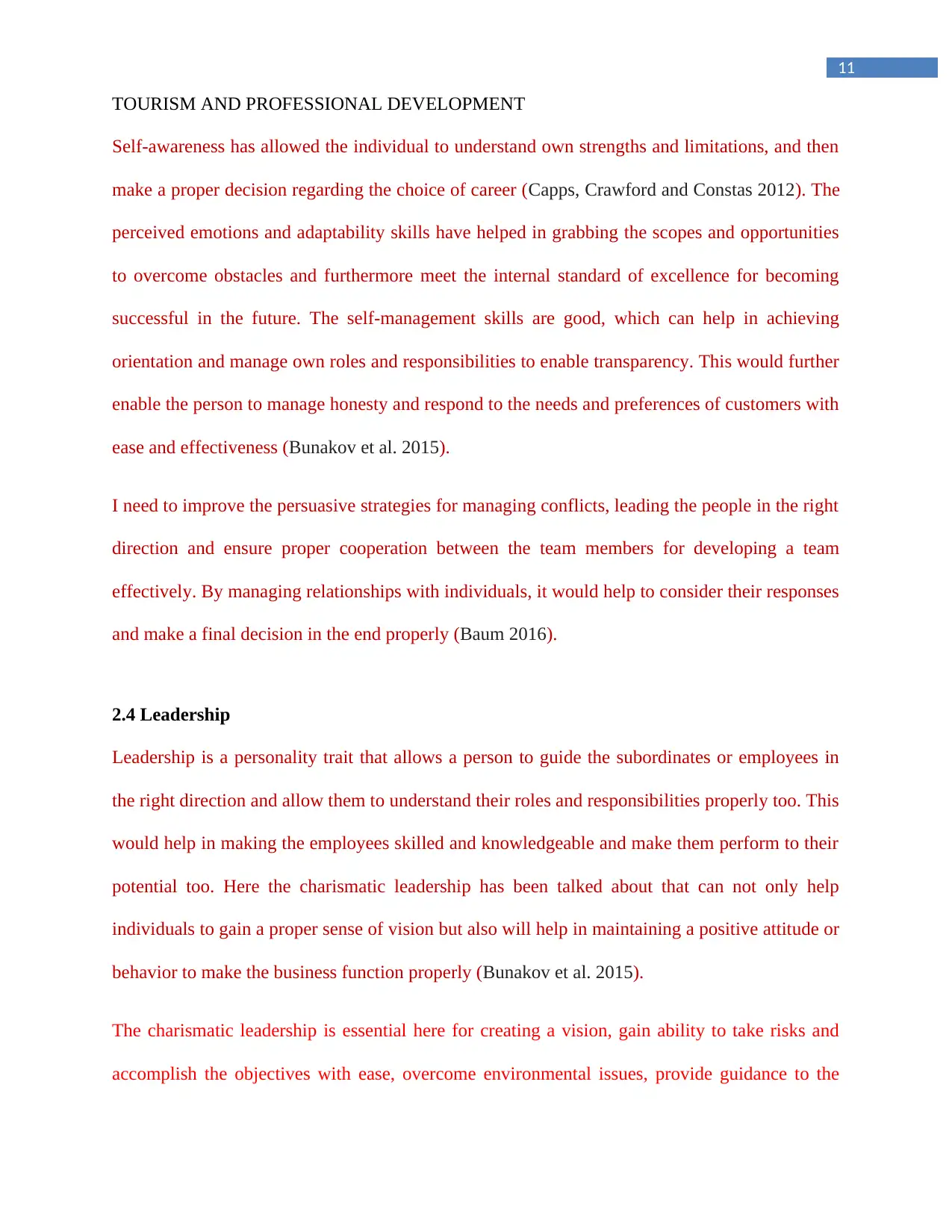
11
TOURISM AND PROFESSIONAL DEVELOPMENT
Self-awareness has allowed the individual to understand own strengths and limitations, and then
make a proper decision regarding the choice of career (Capps, Crawford and Constas 2012). The
perceived emotions and adaptability skills have helped in grabbing the scopes and opportunities
to overcome obstacles and furthermore meet the internal standard of excellence for becoming
successful in the future. The self-management skills are good, which can help in achieving
orientation and manage own roles and responsibilities to enable transparency. This would further
enable the person to manage honesty and respond to the needs and preferences of customers with
ease and effectiveness (Bunakov et al. 2015).
I need to improve the persuasive strategies for managing conflicts, leading the people in the right
direction and ensure proper cooperation between the team members for developing a team
effectively. By managing relationships with individuals, it would help to consider their responses
and make a final decision in the end properly (Baum 2016).
2.4 Leadership
Leadership is a personality trait that allows a person to guide the subordinates or employees in
the right direction and allow them to understand their roles and responsibilities properly too. This
would help in making the employees skilled and knowledgeable and make them perform to their
potential too. Here the charismatic leadership has been talked about that can not only help
individuals to gain a proper sense of vision but also will help in maintaining a positive attitude or
behavior to make the business function properly (Bunakov et al. 2015).
The charismatic leadership is essential here for creating a vision, gain ability to take risks and
accomplish the objectives with ease, overcome environmental issues, provide guidance to the
TOURISM AND PROFESSIONAL DEVELOPMENT
Self-awareness has allowed the individual to understand own strengths and limitations, and then
make a proper decision regarding the choice of career (Capps, Crawford and Constas 2012). The
perceived emotions and adaptability skills have helped in grabbing the scopes and opportunities
to overcome obstacles and furthermore meet the internal standard of excellence for becoming
successful in the future. The self-management skills are good, which can help in achieving
orientation and manage own roles and responsibilities to enable transparency. This would further
enable the person to manage honesty and respond to the needs and preferences of customers with
ease and effectiveness (Bunakov et al. 2015).
I need to improve the persuasive strategies for managing conflicts, leading the people in the right
direction and ensure proper cooperation between the team members for developing a team
effectively. By managing relationships with individuals, it would help to consider their responses
and make a final decision in the end properly (Baum 2016).
2.4 Leadership
Leadership is a personality trait that allows a person to guide the subordinates or employees in
the right direction and allow them to understand their roles and responsibilities properly too. This
would help in making the employees skilled and knowledgeable and make them perform to their
potential too. Here the charismatic leadership has been talked about that can not only help
individuals to gain a proper sense of vision but also will help in maintaining a positive attitude or
behavior to make the business function properly (Bunakov et al. 2015).
The charismatic leadership is essential here for creating a vision, gain ability to take risks and
accomplish the objectives with ease, overcome environmental issues, provide guidance to the
⊘ This is a preview!⊘
Do you want full access?
Subscribe today to unlock all pages.

Trusted by 1+ million students worldwide
1 out of 20
Related Documents
Your All-in-One AI-Powered Toolkit for Academic Success.
+13062052269
info@desklib.com
Available 24*7 on WhatsApp / Email
![[object Object]](/_next/static/media/star-bottom.7253800d.svg)
Unlock your academic potential
Copyright © 2020–2026 A2Z Services. All Rights Reserved. Developed and managed by ZUCOL.




